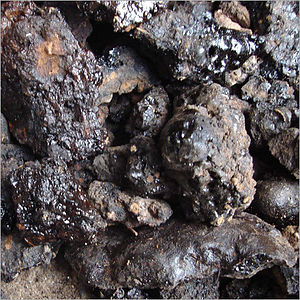In the realm of natural remedies, there exists an ancient Ayurvedic treasure that has captured the attention of both modern science and traditional medicine. Shilajit, derived from the mystical Himalayas, holds immense potential for promoting overall well-being. Beyond its rich mineral content, this remarkable substance has demonstrated efficacy in improving urinary tract problems, enhancing male sexual wellness, and providing relief from prostate issues. In this article, we will delve into the scientific evidence and medical journals that support the medicinal claims of Shilajit.
 .
.
Shilajit and Urinary Tract Problems:
Urinary tract problems can significantly impact one's quality of lifeFortunately, Shilajit has shown promise in alleviating these issues. According to a study published in the Journal of Alternative and Complementary Medicine, Shilajit possesses diuretic properties that aid in flushing out toxins and reducing inflammation in the urinary tract. Its natural compounds have been found to support renal health and improve urinary flow.
Improving Male Sexual Wellness:
Shilajit has long been celebrated for its positive impact on male sexual wellness. A study published in the journal Andrologia investigated the effects of Shilajit on male reproductive health. The findings revealed that Shilajit supplementation led to improved sperm count, motility, and morphology. Additionally, it demonstrated potential in increasing testosterone levels, which can contribute to enhanced libido and overall sexual well-being.
Prostate Problems and Shilajit:

Prostate issues, such as benign prostatic hyperplasia (BPH), can cause discomfort and disrupt normal urination. The therapeutic potential of Shilajit in addressing these concerns has been explored in various studies. A review published in the journal Andrology Open examined the effects of Shilajit on BPH. The researchers found that Shilajit exhibited anti-inflammatory properties and helped reduce prostate size, thereby relieving symptoms related to urination difficulties.
Other potential benefits of shilajit include:
Alzheimer's disease:
Alzheimer's disease is a progressive neurodegenerative disorder that primarily affects memory, cognitive function, and behavior. It is the most common cause of dementia among older adults. The exact cause of Alzheimer's disease is not fully understood, but it involves a combination of genetic, environmental, and lifestyle factors.
In Alzheimer's disease, abnormal protein deposits, such as beta-amyloid plaques and tau tangles, accumulate in the brain, leading to the death of nerve cells and disruption of communication between brain cells. This results in the characteristic symptoms of memory loss, confusion, impaired reasoning, and changes in behavior.
There is currently no cure for Alzheimer's disease, and treatment focuses on managing symptoms and improving the quality of life for affected individuals.
Shilajit is a sticky, tar-like substance that is found in the rocky mountains of the Himalayas, Altai, Caucasus, and other mountain ranges. It is formed over centuries by the decomposition of plant and microbial matter.
While shilajit has been used in traditional medicine systems like Ayurveda for various health purposes, scientific evidence supporting its efficacy for Alzheimer's disease is limited.
Some studies suggest that shilajit may have antioxidant and anti-inflammatory properties, which could potentially be beneficial for brain health. Oxidative stress and inflammation are factors believed to contribute to the development and progression of neurodegenerative diseases, including Alzheimer's.
However, it's crucial to note that more research is needed to establish the effectiveness of shilajit in treating or preventing Alzheimer's disease. Additionally, the quality and composition of shilajit can vary, as it is a natural substance collected from different geographical regions.
If someone is considering using shilajit or any other supplement for Alzheimer's disease, it's important to consult with a healthcare professional. Alzheimer's disease is a complex condition, and treatment decisions should be made under the guidance of qualified medical professionals.
Low testosterone:
Shilajit has been used traditionally in Ayurvedic medicine for various health purposes, including the management of male reproductive health issues. Some proponents claim that shilajit may have potential benefits in cases of low testosterone levels, and there is some preliminary research supporting these claims.
Here are some potential ways in which shilajit might be associated with improving testosterone levels:
1. Fulvic Acid Content: Shilajit contains fulvic acid, which is a compound that may have antioxidant properties. Some studies suggest that fulvic acid may play a role in enhancing testosterone levels and improving male reproductive health. However, more research is needed to establish the exact mechanisms and effectiveness.
2. Mineral Content: Shilajit is rich in minerals such as zinc, copper, and selenium, which are essential for testosterone production. Zinc, in particular, is known to play a crucial role in the synthesis of testosterone.
3. Adaptogenic Properties: Shilajit is considered an adaptogen, meaning it may help the body adapt to stress and maintain balance. Chronic stress can contribute to hormonal imbalances, including low testosterone levels. By potentially reducing stress, shilajit may indirectly support healthy testosterone levels.
It's important to note that while there is some promising research, the evidence regarding shilajit's effectiveness for low testosterone levels is not yet conclusive. Moreover, individual responses to supplements can vary, and the quality of shilajit products on the market may differ.
If you are considering using shilajit or any other supplement to address low testosterone levels, it's crucial to consult with a healthcare professional before starting any new regimen. They can provide guidance based on your specific health status, and they may conduct appropriate tests to determine the underlying cause of low testosterone.
Additionally, lifestyle factors such as a balanced diet, regular exercise, and sufficient sleep play significant roles in maintaining hormonal balance, and these should be considered as part of a comprehensive approach to managing testosterone levels.
.
Chronic fatigue syndrome:
Shilajit is a substance that has been used in traditional Ayurvedic medicine for various health purposes, including its potential adaptogenic properties. Adaptogens are substances that may help the body adapt to stress and maintain balance. Some people believe that shilajit's adaptogenic properties could be beneficial for conditions like chronic fatigue syndrome (CFS). However, it's important to note that scientific evidence on the efficacy of shilajit specifically for CFS is limited.
Here are some potential ways in which shilajit might be associated with managing symptoms of chronic fatigue:
1. Energy and Vitality: Shilajit is often marketed as an energy-boosting supplement. Some proponents claim that it can enhance energy levels and reduce fatigue, which are common symptoms of CFS.
2. Adaptogenic Properties: Shilajit is considered an adaptogen, and adaptogens are thought to help the body cope with stress. Chronic fatigue syndrome is often associated with persistent stress and fatigue, and adaptogens may potentially support the body in managing these challenges.
3. Antioxidant Effects: Shilajit contains compounds with antioxidant properties, which may help combat oxidative stress. Oxidative stress has been suggested as a factor in the development of chronic fatigue, so antioxidants may play a role in managing symptoms.
It's crucial to emphasize that while there is some traditional use and anecdotal evidence supporting the potential benefits of shilajit for fatigue, more rigorous scientific research is needed to establish its effectiveness and safety for conditions like chronic fatigue syndrome.
If you are considering using shilajit or any other supplement to address symptoms of chronic fatigue, it's essential to consult with a healthcare professional first. Chronic fatigue syndrome is a complex condition, and its management often involves a multidisciplinary approach, including lifestyle changes, cognitive-behavioral therapy, and other interventions tailored to individual needs. A healthcare professional can provide personalized guidance based on your specific health situation.
Aging:
Shilajit has been used in traditional Ayurvedic medicine for centuries, and it is believed to offer a range of health benefits, some of which are thought to be relevant to the aging process. However, it's important to note that while shilajit has been studied to some extent, more research is needed to fully understand its mechanisms of action and confirm its benefits. Here are some potential ways in which shilajit may be associated with aging:
1. Antioxidant Properties: Shilajit contains various bioactive compounds, including fulvic acid, which is believed to have antioxidant properties. Antioxidants help combat oxidative stress, a process associated with aging and the development of age-related diseases.
2. Mitochondrial Function: Some studies suggest that shilajit may support mitochondrial function. Mitochondria are the energy-producing structures within cells, and their dysfunction is linked to aging. By potentially improving mitochondrial function, shilajit might contribute to overall cellular health.
3. Anti-Inflammatory Effects: Chronic inflammation is associated with various age-related conditions, including cardiovascular disease and neurodegenerative disorders. Shilajit has been studied for its potential anti-inflammatory effects, and reducing inflammation could be beneficial for overall health.
4. Bone Health: Shilajit contains minerals such as calcium and magnesium, which are essential for bone health. Aging is often associated with a decline in bone density, and adequate mineral intake is crucial to maintain bone strength.
5. Cognitive Function: Some research suggests that shilajit may have neuroprotective effects, which could be relevant to maintaining cognitive function as individuals age. Neurodegenerative diseases, such as Alzheimer's, are associated with aging, and compounds in shilajit may have a protective role.
It's important to approach the use of shilajit or any supplement with caution. The quality and composition of shilajit products can vary, and individual responses may differ. Additionally, more research is needed to fully understand the long-term effects and safety profile of shilajit.
Before considering shilajit or any supplement for anti-aging purposes, it's advisable to consult with a healthcare professional. They can provide personalized advice based on your health status and help you make informed decisions about incorporating supplements into your routine.
High altitude sickness:
Shilajit has been traditionally used in Ayurvedic medicine, and some people believe it may offer benefits for individuals experiencing high-altitude sickness or altitude-related issues. High-altitude sickness, also known as acute mountain sickness (AMS), can occur when individuals ascend to high altitudes relatively quickly, and the body doesn't have enough time to adjust to the changes in air pressure and oxygen levels. Here are some ways in which shilajit is thought to be potentially beneficial for high-altitude sickness:
1. Adaptogenic Properties: Shilajit is considered an adaptogen, which means it may help the body adapt to stressors. In the case of high-altitude sickness, the stressors include reduced oxygen levels and changes in atmospheric pressure. Shilajit's adaptogenic properties might support the body's ability to cope with these stressors.
2. Oxygenation: Some proponents suggest that shilajit may help improve oxygenation at the cellular level. This could potentially be beneficial at high altitudes where oxygen levels are lower, and individuals may experience symptoms like shortness of breath, fatigue, and headaches.
3. Energy and Endurance: Shilajit is often marketed as an energy-boosting supplement. For individuals at high altitudes, where physical exertion can be more challenging due to reduced oxygen availability, the potential energy-boosting effects of shilajit might be considered beneficial.
4. Antioxidant Properties: Shilajit contains compounds with antioxidant properties, which may help combat oxidative stress. High-altitude environments can increase oxidative stress in the body, and antioxidants may play a role in mitigating its effects.
It's important to note that while there is some traditional use and anecdotal evidence supporting the potential benefits of shilajit at high altitudes, scientific research on this specific application is limited. Individual responses to shilajit may vary, and its efficacy for altitude sickness is not universally established.
If you are planning to travel to high-altitude areas and are considering using shilajit or any other supplement to help mitigate altitude-related issues, it's crucial to consult with a healthcare professional. They can provide guidance based on your individual health status and advise on appropriate measures to take to reduce the risk of altitude sickness. Additionally, gradual acclimatization, proper hydration, and other preventive measures are essential when traveling to high altitudes.
Respiratory Tract Infections
Respiratory tract infections (RTIs) are infections that affect the respiratory system, which includes the nose, throat, airways, and lungs. These infections can be caused by viruses, bacteria, or other pathogens, and they can range from mild illnesses, such as the common cold, to more severe conditions like pneumonia. Symptoms of respiratory tract infections may include cough, congestion, sneezing, sore throat, difficulty breathing, and fatigue.
Shilajit is a substance used in traditional Ayurvedic medicine, and some proponents suggest that it may have benefits for respiratory health. However, it's essential to note that while there is some traditional use and anecdotal evidence, scientific research on shilajit specifically for respiratory tract infections is limited. Here are some ways in which shilajit is thought to be potentially beneficial:
1. Anti-inflammatory Properties: Shilajit has been studied for its potential anti-inflammatory effects. Inflammation is a common response to infection, and reducing inflammation may help alleviate symptoms associated with respiratory tract infections.
2. Immune System Support: Some proponents believe that shilajit may support the immune system. A healthy immune response is crucial for combating infections, including those affecting the respiratory tract.
3. Antioxidant Effects: Shilajit contains compounds with antioxidant properties. Antioxidants help neutralize harmful free radicals, and this may be relevant for respiratory infections, as oxidative stress can contribute to inflammation and tissue damage.
4. Expectorant Properties: In traditional medicine, shilajit is sometimes considered an expectorant, which means it may help promote the clearance of mucus from the respiratory system. This could potentially be beneficial for individuals dealing with congestion and respiratory symptoms.
It's important to approach the use of shilajit or any supplement with caution, especially in the context of treating infections. Respiratory tract infections can have various causes, and the appropriate treatment may differ depending on the specific pathogen involved.
If you are experiencing respiratory symptoms or have a respiratory tract infection, it's crucial to seek advice from a healthcare professional. They can help determine the cause of the infection and recommend appropriate treatments, which may include antiviral or antibiotic medications, depending on the nature of the infection. While some people may choose to use traditional remedies, it's important to prioritize evidence-based medical interventions for the treatment of respiratory infections.
Potential Benefits of Shilajit in Cancer
While there is some traditional use and anecdotal evidence suggesting that shilajit may have potential health benefits, including antioxidant and anti-inflammatory properties, there is limited scientific evidence to support its use in the treatment or prevention of cancer. It's crucial to approach any claims about natural remedies for cancer with caution and to rely on evidence-based medical interventions.
Here are some considerations related to shilajit and its potential role in cancer:
1. Antioxidant and Anti-Inflammatory Properties: Shilajit contains compounds with antioxidant and anti-inflammatory properties, which are generally considered beneficial for overall health. These properties may help counteract oxidative stress and inflammation, factors that can contribute to the development and progression of various diseases, including cancer.
2. Fulvic Acid Content: Shilajit is rich in fulvic acid, and some studies suggest that fulvic acid may have potential anti-cancer properties. However, research in this area is in the early stages, and more studies are needed to establish the effectiveness and safety of fulvic acid or shilajit in cancer prevention or treatment.
3. Immunomodulatory Effects: Some proponents suggest that shilajit may have immunomodulatory effects, potentially supporting the immune system in recognizing and combating cancer cells. However, research in this area is limited, and the specific mechanisms involved are not well understood.
It's important to note that cancer is a complex group of diseases, and its treatment requires a multidisciplinary approach based on rigorous scientific evidence. Conventional cancer treatments, such as surgery, chemotherapy, and radiation therapy, have undergone extensive testing and are considered the standard of care.
If you or someone you know is dealing with cancer, it's essential to consult with healthcare professionals who specialize in oncology. They can provide personalized advice and recommend evidence-based treatments tailored to the specific type and stage of cancer.
While some individuals may explore complementary or alternative therapies alongside conventional cancer treatments, it's crucial to discuss these options with healthcare providers to ensure they are safe and do not interfere with standard medical care. The effectiveness and safety of shilajit or any natural remedy in the context of cancer should be thoroughly researched and discussed with qualified medical professionals.
Iron deficiency anemia:
Shilajit is a substance that has been used traditionally in Ayurvedic medicine for various health purposes, and some people believe it may have benefits for individuals with anemia. Anemia is a condition characterized by a deficiency of red blood cells or hemoglobin, leading to reduced oxygen-carrying capacity in the blood. While there is some traditional use and anecdotal evidence, scientific research on shilajit specifically for anemia is limited.
Here are some potential ways in which shilajit might be associated with benefits for individuals with anemia:
1. Iron Content: Shilajit contains various minerals, including iron. Iron is a crucial component of hemoglobin, the protein in red blood cells responsible for carrying oxygen. Some proponents suggest that the iron content in shilajit could contribute to improving iron levels in individuals with iron-deficiency anemia.
2. Fulvic Acid Content: Shilajit is rich in fulvic acid, a compound that may enhance the absorption of minerals, including iron, from the digestive tract. Improved iron absorption could be beneficial for individuals with anemia.
3. Energy and Vitality: Shilajit is often marketed as an energy-boosting supplement. Individuals with anemia often experience fatigue and weakness due to reduced oxygen levels in the blood. The potential energy-boosting effects of shilajit might be considered beneficial for individuals dealing with anemia-related symptoms.
It's important to note that while these potential benefits are suggested based on traditional use and some anecdotal evidence, scientific research on shilajit specifically for anemia is limited. Anemia can have various underlying causes, including nutritional deficiencies, chronic diseases, and genetic factors, and the appropriate treatment may differ depending on the cause.
If you suspect you have anemia or are experiencing symptoms such as fatigue, weakness, or pale skin, it's crucial to consult with a healthcare professional. They can conduct appropriate tests to diagnose the type and cause of anemia and recommend a treatment plan tailored to your specific needs. Treatment for anemia may include dietary changes, iron supplementation, and addressing the underlying cause of the condition.
Infertility:
Shilajit is a substance used in traditional Ayurvedic medicine, and some proponents claim that it may have potential benefits for male reproductive health, including addressing issues related to infertility. However, it's important to note that while there is some traditional use and anecdotal evidence, scientific research on shilajit specifically for infertility is limited.
Here are some potential ways in which shilajit might be associated with benefits for male fertility:
1. Spermatogenic Potential: Some studies have explored the potential spermatogenic (sperm-producing) effects of shilajit. It has been suggested that shilajit may have a positive impact on sperm count, motility, and morphology. However, more research is needed to confirm these findings and understand the mechanisms involved.
2. Testosterone Levels: Shilajit has been studied for its potential to support testosterone production. Testosterone is a hormone that plays a crucial role in male reproductive health. Some proponents believe that by supporting healthy testosterone levels, shilajit may positively influence male fertility.
3. Antioxidant Properties: Shilajit contains compounds with antioxidant properties. Oxidative stress can negatively impact sperm quality, and antioxidants may help mitigate these effects. The potential antioxidant effects of shilajit could be relevant to male reproductive health.
4. Energy and Stamina: Shilajit is often marketed as an energy-boosting supplement. Improved energy and stamina might have positive effects on sexual health and fertility.
It's crucial to emphasize that while these potential benefits are suggested based on traditional use and some preliminary studies, more rigorous scientific research is needed to establish the effectiveness and safety of shilajit for addressing infertility.
If a couple is struggling with infertility, it's advisable to seek guidance from healthcare professionals specializing in reproductive medicine. Infertility can have various causes, both male and female, and the appropriate treatment plan will depend on the underlying factors. Medical interventions, lifestyle modifications, and, in some cases, assisted reproductive technologies may be recommended based on the specific situation.
Before considering shilajit or any supplement for fertility purposes, individuals and couples should consult with healthcare professionals to ensure that the chosen approach aligns with evidence-based practices and does not interfere with other recommended treatments.
Heart health:
Shilajit may help to improve heart health by reducing inflammation and improving blood flow. This could be beneficial for people with heart disease or other cardiovascular conditions.
It is important to note that more research is needed to confirm the benefits of shilajit. Shilajit is generally considered safe, but it is important to talk to your doctor before taking it, especially if you have any health conditions.
Shilajit in preventing Bone Loss and Bone Density
Shilajit is a substance used in traditional Ayurvedic medicine, and some proponents suggest that it may have potential benefits for bone health, including preventing bone loss and maintaining bone density. However, it's important to note that scientific research on shilajit specifically for bone health is shared at the link given below:
Shilajit extract reduces oxidative stress
According to this study, it concludes that:
Conclusion
Daily supplementation with this shilajit extract supports BMD in postmenopausal women with osteopenia in part by attenuating the increased bone turnover, inflammation and oxidative stress that coincides with estrogen deficiency in this population at increased risk for osteoporosis and bone fractures.
However, we recommend that more studies are needed to establish its effectiveness in this regard.
Here are some ways in which shilajit might be associated with potential benefits for bone health:
1. Mineral Content: Shilajit contains various minerals, including calcium, magnesium, and zinc, which are essential for bone health. Adequate intake of these minerals is crucial for maintaining bone density and strength.
2. Fulvic Acid Content: Shilajit is rich in fulvic acid, a compound that may enhance the absorption of minerals from the digestive tract. Improved mineral absorption could contribute to better bone health.
3. Anti-Inflammatory Properties: Some studies suggest that shilajit may have anti-inflammatory effects. Chronic inflammation can contribute to bone loss and osteoporosis, so reducing inflammation may have positive effects on bone density.
4. Adaptogenic Properties: Shilajit is considered an adaptogen, and adaptogens are thought to help the body adapt to stressors. Chronic stress can negatively impact bone health, and the potential adaptogenic properties of shilajit might be beneficial in this context.
While these potential benefits are suggested based on traditional use and some limited studies, it's important to approach the use of shilajit for bone health with caution. Osteoporosis and bone-related conditions are complex, and various factors contribute to bone health, including genetics, diet, physical activity, and hormonal balance.
If you are concerned about bone health or have conditions related to bone density, it's crucial to consult with a healthcare professional. They can conduct appropriate assessments, such as bone density scans, and provide personalized recommendations based on your specific health status.
Maintaining a healthy lifestyle, including a balanced diet rich in essential nutrients, regular weight-bearing exercise, and appropriate supplementation if needed, are important components of promoting bone health. Before incorporating any supplement, including shilajit, into your routine, it's advisable to consult with a healthcare professional to ensure that it aligns with your overall health and is used safely and effectively.
Here are some additional things to keep in mind about shilajit:
- It is available in capsule, tablet, powder, and liquid form.
- The recommended dosage of shilajit varies depending on the product and the individual.
- Shilajit can interact with certain medications, so it is important to talk to your doctor before taking it.
- Shilajit can be expensive.
If you are considering taking shilajit, it is important to do your research and talk to your doctor to make sure it is right for you.
If you want to buy the Best and Certified Medicinal grade Purified Shilajit you can click on the Link below:
Shilajit, sourced from the mystical Himalayas, continues to captivate the medical community with its remarkable medicinal benefits. Supported by scientific studies and publications in esteemed medical journals, its efficacy in improving urinary tract problems, enhancing male sexual wellness, and providing relief from prostate issues is becoming increasingly evident. As always, it is crucial to consult with healthcare professionals before incorporating any new supplement into your routine. Embrace the transformative power of Shilajit and embark on a journey towards holistic well-being and vitality.
Note: The information provided in this article is for educational purposes only and should not replace professional medical advice.



